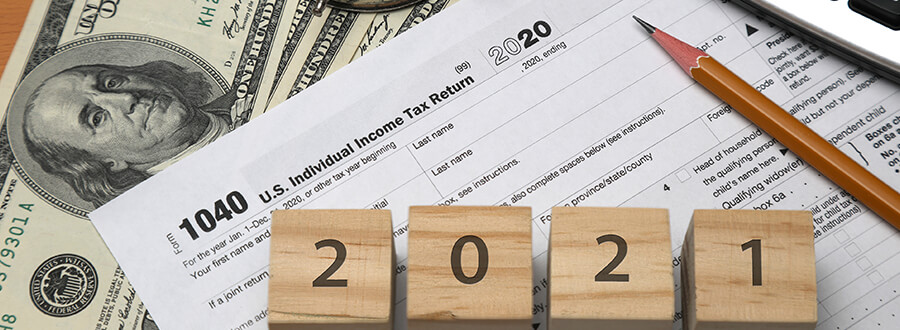Key Points
- Pandemic benefits could increase the amount you owe in taxes.
- The IRS will not tax all pandemic-related assistance.
- Side jobs are often taxed differently than employee wages.

As the economy shut down due to COVID-19, Congress quickly responded with help. The CARES Act provided direct relief payments to most households and additional unemployment to help families recover lost wages. When the unemployment bonus ran out, many consumers turned to gig work and part-time jobs to make ends meet, creating various avenues of income for millions of families in 2020.
The IRS taxes income differently depending on how you receive it, making the 2021 tax season trickier than other years. Here is how the pandemic could affect your taxes this year.
Taxation of Pandemic Relief Payments
In April 2020, the IRS began depositing stimulus checks to households around the country. Most adults received $1,200 per person plus $500 per child for most dependent children.
The CARES Act treated the pandemic relief payments as a tax credit, meaning you will not owe taxes on the amounts received. It will not increase what you owe or decrease your refund.
How to Claim Your Stimulus Payment if You Never Received It
Not everyone received a stimulus payment, even if you qualified. Some examples include those whose income fell in 2020 and would have qualified had the IRS considered the lower wages or families who experienced other problems or changes to their 2018 or 2019 tax returns.
An underpayment could also require you to claim an adjustment. Experts do not anticipate that families receiving an overpayment will have to repay the amounts received.
To receive a missing stimulus payment or underpayment, you can claim the Recovery Rebate Credit on your 1040 tax return. The IRS has a worksheet to help determine how much the IRS owes you.
Taxation on Unemployment Checks
Unemployment compensation does not require Social Security or Medicare taxes, but you do owe federal (and often state) income taxes on amounts received. Tax withholdings on unemployment are not mandatory, potentially creating a tax challenge if you earned a substantial amount of unemployment income.
Paying Taxes on Gig Income
Side jobs can change your tax situation because you must file business taxes on any non-W-2 wage income over $400. The IRS does allow you to deduct qualified business expenses to reduce taxable income. The downside is that you must pay 15.3% in Social Security and Medicare Taxes on all earnings in addition to income taxes.
Can You Deduct Your Home Office as a Business Expense?
The pandemic made 2020 the year of the home office. Employees that traditionally drove to work are now working from home. It could be a makeshift office consisting of a laptop on the kitchen table or a formal space converted from an unused bedroom. Whatever the case, the IRS does not allow everyone working from home to claim the home office deduction.
The general rule is that employees cannot claim a home office, but small business owners, the self-employed, and freelance workers can. The IRS rules are precise about the use of the space and when a home office can be a tax deduction.
Claiming Charitable Deductions
Typically, you must itemize to claim a charitable deduction. However, the CARES Act allows taxpayers to deduct up to $300 in cash donations to a qualified charity. The deduction lowers taxable income dollar-for-dollar.
Final Thoughts
The coronavirus pandemic changed the lives of nearly every American. You will continue to see a disruption due to the virus’s impact on the economy. While some pandemic relief you received in 2020 came tax-free, you may find yourself in a different tax situation this year due to the taxation of unemployment benefits and how the IRS treats gig income.
